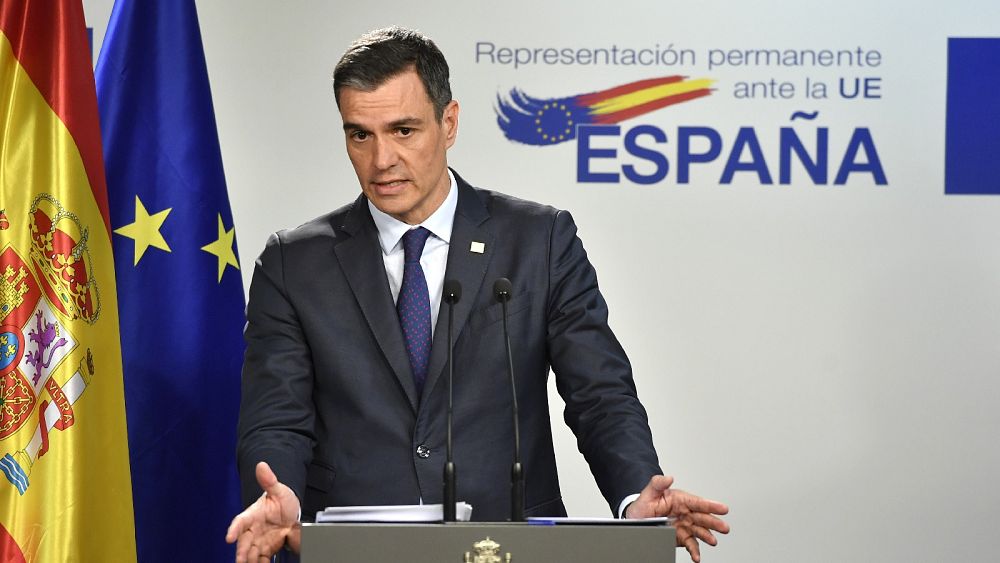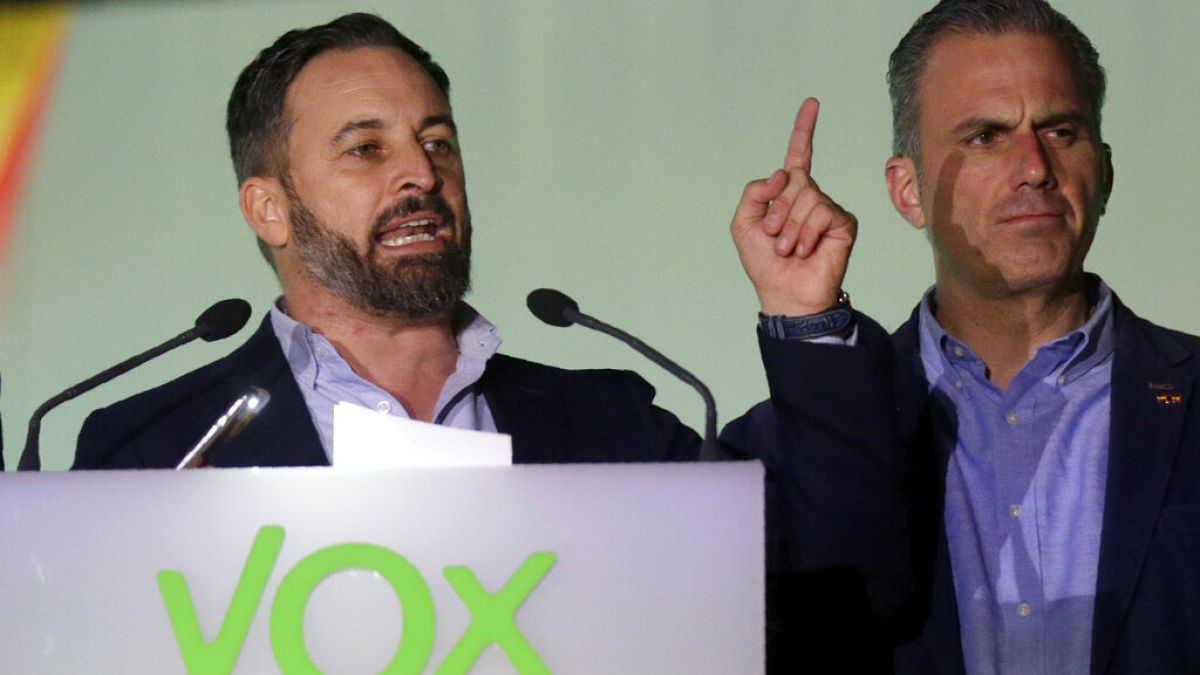World
Here’s why Europe is watching Spain’s regional elections

This month’s regional election in Spain sets the stage for the general election held six months later.
Spaniards will head to the polls later this month to elect over 8,000 local councillors and 12 regional governments.
The elections on May 28 come just six months before Spain must vote for a new national government which polls show could bring either a left or right-wing coalition to power as neither of the two traditional parties are expected to win enough seats to form a majority government.
Instead, they will need to rely on the support of smaller parties, including separatist and far-right parties, to gain power.
The results of May’s regional votes will offer the clearest idea yet as to whether Spain’s minority socialist government will survive, or whether the conservative People’s Party (PP) will form a government with far-right VOX.
Key regions which could change hands
Only 12 of the 17 autonomous regions will hold votes for their regional governments – Andalucia, Galicia, the Basque Country, Catalonia and Castile-León will hold theirs in 2024.
Out of the regions which will go to the polls, Valencia, Aragon, La Rioja, Castilla La-Mancha, Cantabria and the Balearic Islands are the most likely to see close fights with the regions possibly changing hands.
Any regions that do change hands will help determine the mood and momentum of the different parties as they head toward the national vote.
“The results of these regional elections will, for sure, have an impact on the national elections,” Xavier Coller, a Professor of Political Science at UNED University, told Euronews.
However, the regional elections are not just likely to influence the general election, they’re also being influenced by it.
José Olivas, who specialises in Spanish politics and populism claimed that “the upcoming general election is actually already shaping the campaign and the results are going to be interpreted very much with the general elections in mind”.
A fractured political landscape
Prior to 2015, Spain’s politics had been dominated by the two main parties, the left-wing PSOE and the right-wing PP.
However, the emergence and success of new parties, left-wing Podemos and centre-right Ciudadanos originally, followed by the far-right VOX party, have since ended the days of absolute majorities for the foreseeable future.
Since 2015 Ciudadanos has seen its support collapse, losing 47 of its 57 seats in the November 2019 general election, with the party now in a fight for political relevance and survival.
The entry of new parties led to an increase in political instability; Spain went through four elections in four years, resulting in the country’s first nationwide coalition since the Second Republic fell to General Francisco Franco in 1939.
The left works with controversial separatist groups
Under the coalition, Prime Minister Pedro Sánchez’s minority government has had to work with smaller parties including Basque and Catalan secessionists to pass key budgets, a move which prompted anger from the opposition and some from his own party.
EH Bildu was one of those regional parties that voted for Sánchez’s budget.
The party is seen as the heir to Batasuna, which was banned in 2003 for being the political wing of the now-defunct terrorist group ETA, which is blamed for the deaths of at least 853 people in its four-decade campaign of violence for an independent Basque Country.
The issue of working with these groups has taken an unexpected early centre-stage position in the regional elections after EH Bildu unveiled its proposed list of candidates. Amongst them are 44 convicted members of ETA, seven of whom were convicted of murder.
Speaking from the White House where he was on an official visit last week, Sánchez said that “there are things that may be legal but are not decent and this is one of them”.
EH Bildu has since said the seven candidates convicted of murder will not stand, but insists the other candidates should have the right to run under a free democracy.
The controversy is providing PP and VOX with plenty of political ammunition and despite efforts from PSOE to draw a line under the issue, it may now become a key electoral topic.
Beware of the far-right
At the same time that PP warns of a left-wing coalition that relies on separatists, it refuses to say whether it would form a coalition with far-right VOX in December’s general election.
The two parties are already in coalition in Castille-León and polls show that PP may need to form more coalitions with VOX at both regional and national levels in the future.
VOX caused an outcry in January when it proposed that abortion clinics should be forced to offer women images of their foetus and listen to its heartbeat before abortions.
It also caused outrage in 2020 when its leader, Santiago Abascal, told Pedro Sánchez that he headed the worst government in 80 years, a period which includes the dictatorship of Francisco Franco.
Xavier Coller highlighted the irony of both sides trying to attack the other for what they themselves are doing.
“It’s very funny because they are accusing each other of becoming radicalised. And both of them are using the radical vote to the right and to the left in order to keep governing. So that’s a paradox. It’s a funny situation.”
The economy, climate change and Pedro Sánchez
Each party is keen to highlight certain issues on which they think they will perform well.
PSOE, Coller said, “is showing off the economic results of lower unemployment than three years ago, good economic growth and the number of bills passed protecting the less privileged”.
Meanwhile PP, he added, is trying to erode the image of the Prime Minister and his type of politics – known as Sánchismo. In particular, they argue that “Pedro Sanchez has been governing with the help of former terrorists who have never said, I’m sorry and so forth, which to some extent is true, but to some extent is not true,” Coller said.
Another key issue that will affect the regional elections in certain areas is the effect of climate change, especially in the South which has seen record temperatures for April.
The issue of water usage has become a national issue after a bitter disagreement over the protection of Doñana National Park and a decision to limit the diversion of water from the Tagus for crop irrigation.
With just under two weeks to go, anything could happen, but José Olivas predicts that: “Each of the parties is going to have enough success stories for them to use in their campaigns for the coming general election and in a way they will be able to kind of hide their weakest results”.
One thing’s for sure, Spain’s political parties will be on election footing until a new nationwide government is elected.

World
Ukraine's divisive mobilization law comes into force as a new Russian push strains front-line troops
KYIV, Ukraine (AP) — A divisive mobilization law in Ukraine came into force on Saturday, as Kyiv struggles to boost troop numbers after Russia launched a new offensive that some fear could close in on Ukraine’s second-largest city.
The legislation, which was watered down from its original draft, will make it easier to identify every conscript in the country. It also provides incentives to soldiers, such as cash bonuses or money toward buying a house or car, that some analysts say Ukraine cannot afford.
Lawmakers dragged their feet for months and only passed the law in mid-April, a week after Ukraine lowered the age for men who can be drafted from 27 to 25. The measures reflect the growing strain that more than two years of war with Russia has had on Ukraine’s forces, who are trying to hold the front lines in fighting that has sapped the country’s ranks and stores of weapons and ammunition.
Ukrainian President Volodymyr Zelenskyy also signed two other laws Friday, allowing prisoners to join the army and increasing fines for draft dodgers fivefold. Russia enlisted its prisoners early on in the war, and personnel shortages compelled Ukraine to adopt the new measures.
Russian troops, meanwhile, are pushing ahead with a ground offensive that opened a new front in northeastern Ukraine’s Kharkiv region and put further pressure on Kyiv’s overstretched military. After weeks of probing, Moscow launched the new push knowing that Ukraine suffered personnel shortages, and that its forces have been spread thin in the northeast.
Russian President Vladimir Putin said on Friday during a visit to China that the Russian push aims to create “a buffer zone” rather than capturing Kharkiv, the local capital and Ukraine’s second-largest city.
Still, Moscow’s forces have pummeled Kharkiv with strikes in recent weeks, hitting civilian and energy infrastructure and prompting angry accusations from Zelenskyy that the Russian leadership sought to reduce the city to rubble. On Friday, Mayor Ihor Terekhov said that Russian guided bombs killed at least three residents and injured 28 others that day.
Moscow denies deliberately targeting civilians, but thousands have died or suffered injuries in the more than 27 months of fighting.
The U.S. last week announced a new $400 million package of military aid for Ukraine, and President Joe Biden has promised that he would rush badly needed weaponry to the country to help it stave off Russian advances. Still, only small batches of U.S. military aid have started to trickle into the front line, according to Ukrainian military commanders, who said it will take at least two months before supplies meet Kyiv’s needs to hold the line.
Thousands of Ukrainians have fled the country to avoid the draft since Russia’s all-out invasion in February 2022, some risking their lives as they tried to swim across a river separating Ukraine from neighboring Romania and Hungary.
Late on Friday, Ukraine’s border service said that at least 30 people have died trying to cross the Tisza River since the full scale-invasion.
Romanian border guards days earlier retrieved the near-naked, disfigured body of a man that appeared to have been floating in the Tisza for days, and is the 30th known casualty, the Ukrainian agency said in an online statement. It said the man has not yet been identified.
___
Follow AP’s coverage at https://apnews.com/hub/russia-ukraine
World
An unusual autumn freeze grips parts of South America, giving Chile its coldest May in 74 years

Chileans are bundling up for their coldest autumn in more than 70 years mere days after sunning in T-shirts — a dramatic change of wardrobe brought on this week by a sudden cold front gripping portions of South America unaccustomed to bitter wind chills this time of year.
CHILE SHUTS DOWN A POPULAR GLACIER, SPARKING DEBATE OVER CLIMATE CHANGE AND ADVENTURE SPORTS
Temperatures broke records along the coast of Chile and in Santiago, the capital, dipping near freezing and making this month the coldest May that the country has seen since 1950, the Chilean meteorological agency reported.
An unusual succession of polar air masses has moved over southern swaths of the continent, meteorological experts say, pushing the mercury below zero Celsius (32 Fahrenheit) in some places. It’s the latest example of extreme weather in the region — a heat wave now baking Mexico, for instance — which scientists link to climate change.
Footprints create the shape of a heart in a snow-covered rugby field in Santiago, Chile, Wednesday, May 8, 2024. (AP Photo/Matias Basualdo)
“The past few days have been one of the longest (cold fronts) ever recorded and one of the earliest ever recorded” before the onset of winter in the Southern Hemisphere, said Raul Cordero, a climatologist at Santiago University. “Typically the incursions of cold air from the Antarctic that drive temperatures below zero occur from June onwards, not so much in May.”
The cold front sweeping in from Antartica has collided with warm air pushing in from the northwestern Amazon, helping fuel heavy rainstorms battering Brazil, according to that country’s National Meteorological system.
Chile’s government issued frosty weather alerts for most of the country and ramped up assistance for homeless people struggling to endure the frigid temperatures on the streets. Snow cloaked the peaks of the Andes and fell in parts of Santiago, leading to power outages in many areas this week.
“Winter came early,” said Mercedes Aguayo, a street vendor hawking gloves and hats in Santiago.
She said she was glad for a boost in business after Chile’s record winter heat wave last year, which experts pinned on climate change as well as the cyclical El Niño weather pattern.
“We had stored these goods (hats and gloves) for four years because winters were always more sporadic, one day hot, one day cold,” Aguayo said.
This week’s cold snap also took parts of Argentina and Paraguay by surprise.
Energy demand soared across many parts of Argentina. Distributors cut supplies to dozens of gas stations and industries in several provinces to avoid outages in households, , the country’s main hydrocarbon company, CECHA, said Thursday.
World
Brussels, my love? Transparency over MEPs' side jobs

In this edition, we look at what lawmakers’ extracurricular activities mean for their core role.
This week, we are joined by Sophia Russack, senior researcher from the Centre for European Policy Studies, Petros Fassoulas, secretary general of European Movement International and Anna Nalyvayko, senior project officer from the Wilfried Martens Center.
Panelists debate the ethical questions raised by MEPs who have side jobs. Those extra roles are legal, but the political earthquake caused by the Qatarargate scandal led to tighter rules and more transparency.
Is this enough to bridge the gulf between citizens and politicians, in today’s fractured political landscape?
“We see that they have improved rules when it comes to reporting requirements, to laying open your financial situation before and after the offers, and so on. But to be honest, none of these things will prevent another Qatargate,” said Sophia Russack, a think tanker who is an expert in EU institutional architecture, decision-making processes and institutional reform.
Despite these concerns, Petros Fassoulas said MEPs shouldn’t abandon contact with the real world altogether.
“It’s important for them to have the opportunity to bring expertise from outside and engage also with the world outside of the chamber,” Fassoulas said. “An MEP or any parliamentarian should be in contact with the people that they regulate, the businesses that they have an impact on.”
Guests also discussed the reasons for the crisis of public confidence in politicians, and gave some ideas for solutions.
Watch “Brussels, my love?” in the player above.
-

 World1 week ago
World1 week agoPentagon chief confirms US pause on weapons shipment to Israel
-

 Politics1 week ago
Politics1 week agoRFK Jr said a worm ate part of his brain and died in his head
-

 Politics1 week ago
Politics1 week agoOhio AG defends letter warning 'woke' masked anti-Israel protesters they face prison time: 'We have a society'
-

 News1 week ago
News1 week agoNine Things We Learned From TikTok’s Lawsuit Against The US Government
-

 Politics1 week ago
Politics1 week agoBiden’s decision to pull Israel weapons shipment kept quiet until after Holocaust remembrance address: report
-

 Education1 week ago
Education1 week agoVideo: Police Use Pepper Spray on Protesters on G.W.U.’s Campus
-

 World1 week ago
World1 week agoA look at Chinese investment within Hungary
-

 News1 week ago
News1 week agoThe Major Supreme Court Cases of 2024






:quality(70)/cloudfront-eu-central-1.images.arcpublishing.com/dlnews/J3B5VUB4AJBETGDNWVTTBSEACE.jpg)











